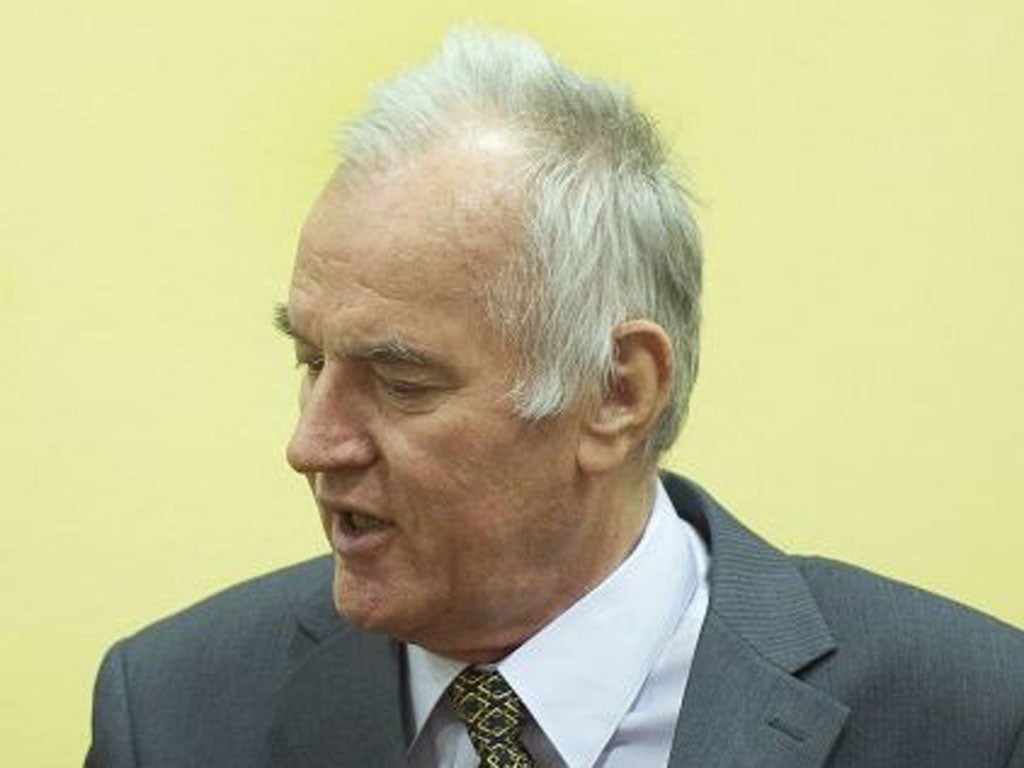
Your support helps us to tell the story
From reproductive rights to climate change to Big Tech, The Independent is on the ground when the story is developing. Whether it's investigating the financials of Elon Musk's pro-Trump PAC or producing our latest documentary, 'The A Word', which shines a light on the American women fighting for reproductive rights, we know how important it is to parse out the facts from the messaging.
At such a critical moment in US history, we need reporters on the ground. Your donation allows us to keep sending journalists to speak to both sides of the story.
The Independent is trusted by Americans across the entire political spectrum. And unlike many other quality news outlets, we choose not to lock Americans out of our reporting and analysis with paywalls. We believe quality journalism should be available to everyone, paid for by those who can afford it.
Your support makes all the difference.Ratko Mladic's genocide trial was halted today for a second day running because the former Bosnian Serb military commander was undergoing medical tests and under observation after being rushed to a hospital a day earlier.
Mladic's seat in in the Yugoslav war crimes tribunal courtroom was empty as the trial briefly resumed.
Tribunal spokeswoman Nerma Jelacic said this afternoon that Mladic was discharged from a hospital and sent back to his cell.
"Ratko Mladic has returned to the detention unit after medical examinations confirmed there were no abnormalities in his health status and that no treatment is required," Jelacic said in a statement. "The previous determination that Mladic is fit to stand trial therefore remains unchanged."
Mladic's lawyer said he initially feared the 70-year-old former general had a stroke when he complained of feeling ill in court Thursday, but that tests had ruled that out.
"Now we think either it's a high level of sugar in his blood or high blood pressure, since he had both higher than normal yesterday," Branko Lukic told reporters outside the courtroom. "We are hopeful that we will continue on Monday."
However, Lukic warned that Mladic's frail health could be imperiled by his trial and hinted he would apply to further reduce the time he spends in court each week.
The complex trial, covering atrocities spanning the entire 1992-1995 Bosnian war that left 100,000 people dead, already is expected to last years and has so far had sittings scheduled for only one morning or afternoon session per day.
"There is some kind of recommendation from the medical staff as well that he should have more rest during the day and we think we should have less working days during the week as well," Lukic said. "It is too much for him. It's not only sitting and listening, it's stressful too. Obviously, it did affect him."
Lukic's concerns raise the specter of the trial of former Yugoslav President Slobodan Milosevic, which had to be aborted without a verdict when he died in his cell of a heart attack in 2006.
Milosevic's trial dragged on for four years in part because of his ill health repeatedly holding up proceedings.
The leader of a group that represents family members of some of the 8,000 Muslim men killed in the 1995 Srebrenica massacre said she hoped Mladic would survive.
"We wish him a good recovery. We pray to God that he gets well because if he dies, justice will die with him and the victims will be betrayed again," said Munira Subasic, the head of the Mothers of Srebrenica group. "We need him to be convicted. We need it for our own history. We do not want the Milosevic situation to be repeated."
Mladic also has had poor health during his 16 years as a fugitive from international justice and since his arrest last year and transfer to a cell in The Hague.
Since arriving in the Netherlands, Mladic has undergone surgery for a hernia and been treated for other ailments including a kidney stone and pneumonia.
But as witness testimony at his long-awaited trial got under way this week he looked healthier than at any time since his arrest.
Fearing a similar scenario to Milosevic's aborted trial, prosecutors last year unsuccessfully applied to judges to split Mladic's trial into two separate cases, fearing his health was too fragile for such a lengthy case.
Prosecutors proposed trying Mladic first for the 1995 Srebrenica massacre, for which he is accused of genocide, before starting a separate trial on charges of masterminding other Serb atrocities throughout Bosnia's 1992-95 war that left 100,000 dead.
Mladic denies any wrongdoing during his time as leader of the Bosnian Serb military, arguing that his forces were defending Serb interests.
The trial is scheduled to resume on Monday and continue for the remainder of the week before pausing for the tribunal's three-week summer recess.
AP
Join our commenting forum
Join thought-provoking conversations, follow other Independent readers and see their replies
Comments